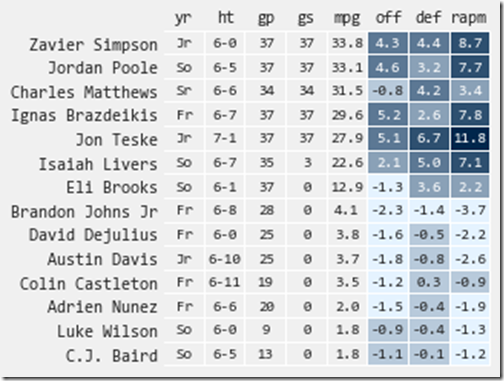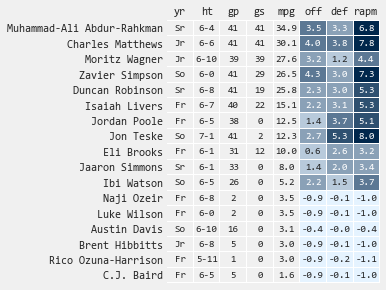As far as Izzo and Beilein are concerned, the most telling bit for me was when Izzo publicly stated to the media that Winston had “unfinished business” in East Lansing, and that this would factor into his decision. Can you imagine Beilein saying that about a specific player who had not yet made a decision on staying or going? I can’t.
Random thoughts…
I see this a lot…“that player should stay in college and improve his game”. A player can improve his game in the G-league, on the bench in the NBA, or overseas.
We like to criticize Izzo regarding leaving early but I think its more about Izzo’s recruiting than anything (Bridges was an outliner - even his mother wanted him to leave"), Harris stayed 2 years and it worked out well for him, Kalin Lucas not so much.
There is a lot of talk about the G-league salary but if you are from a low income family(I don’t know the situation of our players) $72K would sound like a good pay day.
I understand your position and won’t argue that $72k is a lot to many families. That said, the right answer to me is always based on the following questions:
- Does the player have a legit shot at the NBA?
- What is the best chance of that player getting drafted and a guaranteed contract? By that I mean, do they leave early and play in Europe/G League or do they stay in college. What is the best way to not be lost in the system and have the best shot to be noticed.
- If the player likely does not have NBA talent, is that player taking college seriously? Can they get a degree? If a player is not really going to classes etc, then a degree might not help them much.
- You get 1 really good shot to showcase your skills to the NBA (the combine). When do you take your shot. Timing means a lot. Again, some players will get lost in the numbers if they leave too early.
I don’t begrudge players for leaving early. I do cringe at what I perceive as making a bad business decision. That said, as you stated, money is money and some need it more than others.
Harris at best stayed stagnant or at worst dropped 3-4 spots. He was a projected lotto pick as a freshman and lost some draft points after he had absurdly bad halfcourt at the rim numbers as a sophomore. It was something crazy like he only had 20 points at the rim in the halfcourt all year.
When discussing Izzo’s agency over the decision of Tillman and especially Winston, there is a tendency to act as if all kids want the same things, and further, that Winston is blindly led astray. I find such portrayals more insulting of Winston than Izzo.
Also: Vecenie’s comment about Brazdeikis’ defense were within the context of his athleticism and his ability to guard the perimeter - something he will need to do as a pro.
Cassius Winston is a VERY intelligent young man. He seems to be extremely mature. There were times late in the season that he was the coolest head between himself and Tom Izzo. So, I would agree, I don’t think Cash is being led astray by Tom Izzo.
I just have so much respect for Cassius Winston, and frankly, I love that he is staying in school and graduating, for whatever reason that is happening. He truly is a scholar athlete, in my opinion.
With his academic ability, I still don’t understand why Cassius didn’t go to Harvard.
Goodness, there is some ridiculous salt in this thread.
How so? I’m a Canadian and I know we use grades differently than you guys.
An A- for Livers seems non-controversial to me and while Matthews could have been given an A+, I’d probably want him to have been better than 17th in the conference in steals.
Simpson for a PG was probably an A- this year or even generously an A (again, Winston and Texas Tech and not being as elite a shutdown guy as last year), but I think basketball has moved to a situation now where smaller guys are capped at an A or A- because they can’t play elite help D or switch without any issues or not have to worry about crossmatches and again, Simpson was like 20th in steals per minute in the conference, which you’d probably want to be higher to give a guy a close to perfect grade.
So yeah, maybe A- for Simpsons is more fair for stopping penetration and I was punishing him too hard for Winston playing well against us when that was more of a function of the pick and roll defense overall rather than just him.
Livers was in no way a more important (or better, however you want to define) defensive player than Zavier Simpson.
Steals per game is not a stat I would really value as far as grading people defensively, either.
I just have a hard time putting Livers into the Simpson/Matthews/Teske tier defensively. Those three were elite defensively, Livers was good as a defensive four but struggled to defend threes or fives when he had to.
Bruno Fernando just announced he’s not coming back to Maryland.
https://mgoblog.com/content/let's-chisel-some-stuff-out-weird-plusminus-stat
This new stat may or may not be useful, but it does support my general view, so here it is!
Haven’t looked at the numbers in depth but a regression-based +/- stat is going to be messy (at a bare minimum) for a team that played its bench fewer minutes than all but three teams in the country.
Here’s the chart btw:
And here’s the actual research:
http://tothemean.com/2019/04/27/ncaa-rapm.html
For example, last year Jordan Poole graded out better than Zavier Simpson who was equal to Duncan Robinson on defense.
I read the mgo post. Sounds like this measures how much better than your own team’s replacement you are. If I understood correctly, you can’t really compare players across positions. No way is Jordan a better defender than X, but his delta over his replacement could be higher than X’s, which seems more plausible.
This is the article to read (I haven’t yet): http://tothemean.com/2019/04/27/ncaa-rapm.html
Either way, I’m generally always wary of box score dependent stats to measure defensive importance. A lot of the NBA methodology that does a good job of it there can’t account for the fact that college teams play basically the same team all the time.
I haven’t looked through to compare but I bet the RAPM does a lot more math to come up with something that largely rates out the same way as the standard BPM stuff. (Edit: It is actually different in some spots, the article has a table of “most different” entries)
But Jordan was primarily backing up MAAR, who was a good defender, in fact he was also rated higher than X.
The numbers are different for the 2018-19 season, but Poole still graded out surprisingly high.
So, last year looks like this, defensively, in tiers:
Teske
Matthews-Poole
MAAR-Simpson-Robinson-Livers
Brooks
Simmons
Wagner
that basically looks right with the exception of Simpson being a tier low and Poole being probably 2 tiers too high (though 13 minutes a game means smaller sample size).
I love Simpson on D but I think small guards are basically the least impactful defender you can have and length and interchangeability are just so important these days. If you replaced Simpson with a good but not great 6’4 guard like one of the Minnesota starting, I think the D drops from #2, but still comfortably top 10 in the country.
Robinson being good on D made little sense and was tough to see coming, but we all remember how he ended the season as a very, very good team defender after some early struggles where Livers looked the better 4. By the end of the season, Robinson was basically always in the right place and again, being 6’8 and able to guard multiple positions is helpful.
The metric is fine, I have not looked into it and don’t really know anything about it so tough to debate the general results of it. Seems like a lot of smart math went into it. Michigan is always going to be a terrible use case because so many players played such a large percentage of minutes. Matthews also is probably hurt by missing two of Michigan’s better adjusted performances of the year (huge blowout vs Nebraska and 9pt win at Minnesota)
On last year’s defense, what I saw with my eye is that Zavier Simpson, Charles Matthews and Jon Teske were by far the most important defensive players. There might even be a gap tier in between them and the rest of the group. I don’t care what RAPM says.
Simpson isn’t tall but you can’t downplay his defense. Matthews was one of the best off ball defenders in the Big Ten, etc.
I just think you have to take into account the fact that a team of 4 Matthews and a decent big is a top 5 defence in the country and 4 Simpson’ and a decent big doesn’t crack the top 15 with their size issues. That makes Matthews a better defender than Simpson.

